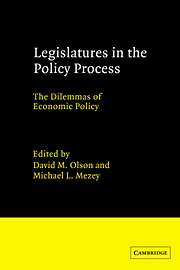Book contents
- Frontmatter
- Contents
- List of contributors
- Preface
- Acknowledgments
- PART I INTRODUCTION
- PART II MACROECONOMIC POLICY
- 2 Legislative oversight of monetary policy in France, Germany, Great Britain, and the United States
- 3 The US Congress and credit policy – institutional and policy implications
- 4 Industrial policy agenda and options in Congress and the executive in the United States
- PART III MICROECONOMIC POLICY
- PART IV CONCLUSION
- Name index
- General index
3 - The US Congress and credit policy – institutional and policy implications
Published online by Cambridge University Press: 03 March 2010
- Frontmatter
- Contents
- List of contributors
- Preface
- Acknowledgments
- PART I INTRODUCTION
- PART II MACROECONOMIC POLICY
- 2 Legislative oversight of monetary policy in France, Germany, Great Britain, and the United States
- 3 The US Congress and credit policy – institutional and policy implications
- 4 Industrial policy agenda and options in Congress and the executive in the United States
- PART III MICROECONOMIC POLICY
- PART IV CONCLUSION
- Name index
- General index
Summary
According to Olson and Mezey, the policy activity of legislatures is affected by policy attributes, by internal party and committee characteristics, and by a constellation of outside factors, such as executive branch and interest group involvement, that define the legislature's political environment. Within these broad categories are numerous, specific variables that appear to be related to the extent and means of parliamentary participation in policy. A central research issue is whether and how these variables affect legislative policy-making.
This chapter addresses this research issue by focusing on the US Congress and credit policy. For over half a century, Congress has played a central role in initiating and expanding federal direct loan and loan guarantee programs serving a broad spectrum of borrowers and economic interests. In recent years, government credit programs have accounted for a “substantial portion of the funds moving through US capital markets”, and the “outstanding volume of loans supported by government or government-sponsored agencies [has] exceeded a trillion dollars…”
The long-standing, influential participation by Congress in credit policy-making may provide insights about the salient variables that sustain legislative activity. In addition, the growing controversies over the size and proliferation of credit programs may advance our understanding of the institutional capabilities or competence of legislatures in economic policy-making. Mezey has argued, for example, that the “policy-making performance of the legislature is for the most part determined by characteristics generic to all legislatures rather than to the quirks and traits of specific institutions”.
- Type
- Chapter
- Information
- Legislatures in the Policy ProcessThe Dilemmas of Economic Policy, pp. 59 - 80Publisher: Cambridge University PressPrint publication year: 1991



